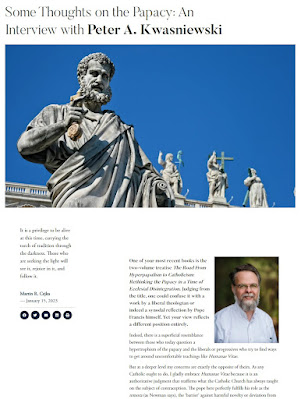A few days ago, The European Conservative online published an extensive interview with me on the topic of the papacy. Here is an excerpt:
MC: One of your most recent books is the two-volume treatise The Road From Hyperpapalism to Catholicism: Rethinking the Papacy in a Time of Ecclesial Disintegration. Judging from the title, one could confuse it with a work by a liberal theologian or indeed a synodal reflection by Pope Francis himself. Yet your view reflects a different position entirely.
PAK: Indeed, there is a superficial resemblance between those who today question a hypertrophism of the papacy and the liberals or progressives who try to find ways to get around uncomfortable teachings like Humanae Vitae.
But at a deeper level my concerns are exactly the opposite of theirs. As any Catholic ought to do, I gladly embrace Humanae Vitae because it is an authoritative judgment that reaffirms what the Catholic Church has always taught on the subject of contraception. The pope here perfectly fulfills his role as the remora (as Newman says), the ‘barrier’ against harmful novelty or deviation from the deposit of the Faith. The liberals, on the other hand, wish to be freed from traditional teachings they no longer agree with. They are dissenters from Catholic tradition. Today’s traditionalists are not dissenters, but rather, upholders of the perennial magisterium and practice of the Church, which is now under attack from the pope himself.
This is why I compare our situation to an autoimmune disease: the body is attacking itself. The head is attacking the members and, indeed, attacking the eternal head, Jesus Christ, as well as the entire line of vicars who have served in the capacity of head of the Church over the past 2,000 years. And that’s why I also speak of “ecclesial disintegration.” The Church will not actually disintegrate, in the sense of ceasing to exist; but there are centrifugal forces tearing apart the Church on earth. It is truly a dramatic time.
Read the rest of the interview over there (link), including my response to those who accuse the proponents of "recognize and resist" of being like Protestants or of fostering an exodus to Eastern Orthodoxy.
